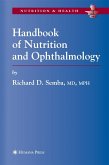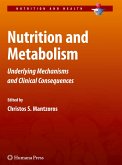Leading academic and biomedical researchers comprehensively review the status of essential fatty acids (EFA) in nutrition, medicine, psychology, and pharmacology. Topics range from a discussion of EFA basic mechanisms to their effects on individual psychiatry and behavior, and include extensive coverage of pathology, DHA in CNS development, and phospholipid and fatty acid composition and metabolism. Comprehensive and forward-looking, Fatty Acids: Physiological and Behavioral Functions reviews and critically evaluates our current knowledge of EFA, setting the stage for oncoming wave of discovery about the biochemical and molecular functions of essential fatty acids, as well as their critical role in human physiology, immunology, and behavior. Essential fatty acids (EFA) are now universally recognized for their profound effects on cardiovascular health, immunological response, and cognitive, visual, and emotional development in infants. In Fatty Acids: Physiological and Behavioral Functions, leading academic and biomedical investigators comprehensively review the status of these special chemical entities in nutrition, medicine, psychology, and pharmacology. Topics range from a discussion of EFA basic mechanisms to their effects on individual psychiatry and behavior, and include extensive coverage of pathology, docosahexaenoic acid (DHA) in CNS development, and phospholipid and fatty acid composition and metabolism. The contributors fully examine the competition involved in maintaining tissue EFA, tissue physiology as proof of EFA importance, the biomarkers associated with complex EFA-mediated events, and the significant role of EFA in vision, learning, and behavior. They also demonstrate the physiological consequences of dietary EFA supply for health maintenance and disease prevention.
Comprehensive and forward-looking, Fatty Acids: Physiological and Behavioral Functions reviews and critically evaluates our current knowledge of essential fatty acids, setting the stage for the oncoming wave of discovery about the biochemical and molecular functions of EFA, as well as their critical role in human physiology, immunology, and behavior.
Comprehensive and forward-looking, Fatty Acids: Physiological and Behavioral Functions reviews and critically evaluates our current knowledge of essential fatty acids, setting the stage for the oncoming wave of discovery about the biochemical and molecular functions of EFA, as well as their critical role in human physiology, immunology, and behavior.
From the reviews:
"This book represents the state of the art on EFA physiology and function. Some chapters are finely written. Particularly interesting are those dealing with the evolutionary aspects of diet, the importance of DHA in central nervous system development, and the role of EFA in cognitive function and psychiatric disorders....The editors...must be congratulated for expediting the publication of this timely and important textbook. It looks to the future, and sets the stage for what is becoming an exciting field of research. Lipid biochemists, nutritionists, developmental biologists and neuroscientists would benefit from this book. Academic libraries must have copies of it..." - Canadian Journal Gastroenterol
"Of interest to nutritionists, psychiatrists and basic investigators in these fields, such as psycho-pharmacologists, but also neonatologists may find some interesting data on metabolic influences on brain development." - Journal of Pediatric Endocrinology & Metabolism
"The book is successfully edited by three experts...the 23 chapters are written by additional specialists, resulting in an impressive gathering of expertise. The book is clear and easy to grasp through a brief study...the book is a goldmine for anybody interested in current nutrition and medical aspects of fatty acids." - Scandinavian Journal of Nutrition
"The book will undoubtedly stimulate further research in these fields. It can be recommended to all scientists interested in the fundamental aspects of nutrition." - Acta Cardiologica
"The book gives detailed reviews of biochemical and molecular functions of essential fatty acids(EFA) under consideration of their role in different associated fields like human physiology, immunology, health and disease prevention as well as behavioral functions, just to name a few of them." - Nahrung/Food
"...Fatty Acids is timely and can help lipid researchers to catch up with the most recent knowledgein the field. I strongly recommend this book for PUFA researchers. It is also a must for postgraduate students in this field." European Journal of Lipid Science and Technology
"...this is an exciting monograph that hopefully will bring the importance of the essential fatty acids to the attention of a wide body of basic and clinical neuroscientists as well as the increasing band of researchers who are interested in 'nutripharmaceuticals'. Monographs such as this help to give credibility to the old adage 'we are what we eat' but, as many of the authors of this volume emphasize, much remains to be discovered regarding the mechanism whereby the essential fatty acids produce their diverse biological effects." -Human Psychopharmacology
"...provides a great deal of information about fatty acid activities across a number of disciplines." - Today's Life Science
"Collectively, more than 2000 citations provide adequate documentation of the information in the 420 pages and 23 chapters by authors with recognized expertise in the areas of their respective contributions. These contributors discuss the role of EFAs in metabolism, immunity, aging, perinatal development, and psychiatric, neurologic, and cognitive disorders in considerable detail. ... this book is worth owning and reading by everyone interested in increasing familiarity with the subject." (Barry S. Kendler, American Journal of Clinical Nutrition, Vol. 22, July, 2006)
"This book represents the state of the art on EFA physiology and function. Some chapters are finely written. Particularly interesting are those dealing with the evolutionary aspects of diet, the importance of DHA in central nervous system development, and the role of EFA in cognitive function and psychiatric disorders....The editors...must be congratulated for expediting the publication of this timely and important textbook. It looks to the future, and sets the stage for what is becoming an exciting field of research. Lipid biochemists, nutritionists, developmental biologists and neuroscientists would benefit from this book. Academic libraries must have copies of it..." - Canadian Journal Gastroenterol
"Of interest to nutritionists, psychiatrists and basic investigators in these fields, such as psycho-pharmacologists, but also neonatologists may find some interesting data on metabolic influences on brain development." - Journal of Pediatric Endocrinology & Metabolism
"The book is successfully edited by three experts...the 23 chapters are written by additional specialists, resulting in an impressive gathering of expertise. The book is clear and easy to grasp through a brief study...the book is a goldmine for anybody interested in current nutrition and medical aspects of fatty acids." - Scandinavian Journal of Nutrition
"The book will undoubtedly stimulate further research in these fields. It can be recommended to all scientists interested in the fundamental aspects of nutrition." - Acta Cardiologica
"The book gives detailed reviews of biochemical and molecular functions of essential fatty acids(EFA) under consideration of their role in different associated fields like human physiology, immunology, health and disease prevention as well as behavioral functions, just to name a few of them." - Nahrung/Food
"...Fatty Acids is timely and can help lipid researchers to catch up with the most recent knowledgein the field. I strongly recommend this book for PUFA researchers. It is also a must for postgraduate students in this field." European Journal of Lipid Science and Technology
"...this is an exciting monograph that hopefully will bring the importance of the essential fatty acids to the attention of a wide body of basic and clinical neuroscientists as well as the increasing band of researchers who are interested in 'nutripharmaceuticals'. Monographs such as this help to give credibility to the old adage 'we are what we eat' but, as many of the authors of this volume emphasize, much remains to be discovered regarding the mechanism whereby the essential fatty acids produce their diverse biological effects." -Human Psychopharmacology
"...provides a great deal of information about fatty acid activities across a number of disciplines." - Today's Life Science
"Collectively, more than 2000 citations provide adequate documentation of the information in the 420 pages and 23 chapters by authors with recognized expertise in the areas of their respective contributions. These contributors discuss the role of EFAs in metabolism, immunity, aging, perinatal development, and psychiatric, neurologic, and cognitive disorders in considerable detail. ... this book is worth owning and reading by everyone interested in increasing familiarity with the subject." (Barry S. Kendler, American Journal of Clinical Nutrition, Vol. 22, July, 2006)








